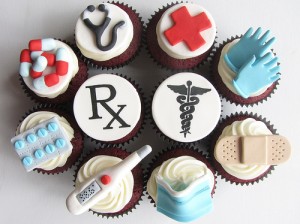 Adulthood brings big changes for our kids’ health care.
Adulthood brings big changes for our kids’ health care.
They’ll be transitioning from pediatric to adult health providers, and their legal rights and responsibilities for medical decisions will change when they reach the age of majority. They’ll need to understand, manage, and communicate their health needs.
All this is too much to digest all at once. Better if we and our kids take it all in gradually. One small bite at a time.
Young adults’ perspective
Let’s start by listening to young people who have already made the transition to adult health care. We can learn much from their experiences as they gradually grew more informed and self determined in this vitally important aspect of their lives.
This video explains many details about health care transition. Too much to really take in at once. But I encourage you to listen to the young people expressing their views on each issue. Watch the video when you have time to really take it in.
Click here for the 29 minute video brought to us by ICHP (Institute of Child Health Policy) at the University of Florida.
For a transcript of the video, click here.
What thoughts and feelings bubble up when you watch the video?
- How did the experiences and views of these young people affect you?
- How do you feel about the changing role of parents from “managers to consultants”?
- Even if your child has an intellectual disability that impacts decision making and you plan to seek guardianship or power of attorney to make medical decisions for your child after age 18, how can your child experience the dignity of participating actively in his or her health care?
- Will you watch the video with your child? Now or at some point in the future?
Bit by Bit
To help kids and parents take action incrementally over time, the second half of the video describes three stages of growing independence. With a checklist of milestones for each.
Like any checklist, these are not exhaustive, and individual kids may reach milestones in their own sequence. Some milestones will need to be adapted to your child’s needs. Still, the checklists are a good place to start.
Here are the ICHP checklists for each stage:
Getting Started
- I can describe how my disability or health condition affects my daily life
- I can name my medications and the amount and times I take them
- I answer at least one question during a health care visit
- I have talked with my doctors or nurses about going to different doctors when I am an adult
- I manage my medical tasks at school
- I can call my doctor’s office to make or change an appointment
On Your Way
- I keep a personal health notebook or medical journal
- I re-order my medications when my supply is low and call my doctor when I need a new prescription
- I answer many of the questions during a health care visit
- I spend most of the time alone with the doctor(s) during a health care visit
- I tell my doctor(s) if I understand and agree with the medications and treatments they suggest
- I know if my doctor(s) do not take care of patients who are older than a certain age
- I regularly do chores at home
- I can tell someone the difference between a primary care doctor and a specialist
Taking Charge
- I can tell someone the effects that getting older have on my disability or health care condition
- I can tell someone the medications that I should not take because of allergies or interactions with the medicines I do take
- I am alone with doctors or choose who is with me during health care visits
- I answer all the questions during a health care visit
- I have identified new doctors and facilities I will go to when I leave my current doctors and facilities
- I manage all my regular medical tasks at home and outside home (school/work)
- I can tell someone what new legal rights I gained when I turned 18 (sign medical consent, make medical decisions myself)
- I can tell someone how long I can be covered on my parent’s health insurance and what I need to do to maintain coverage
Think-Plan-Do
Consider talking with your child about the checklists. Which milestones has your child reached already? Celebrate them as steps toward growing independence! Which milestone does your child want to work toward next?
The Think-Plan-Do strategy is a great way to support your child to plan steps toward any goal of his or her choice. Including these health care transition milestones. Not familiar with the strategy? Click here to learn more.
Having a voice
Growing up means learning to speak for oneself. In every aspect of life. It’s a gradual process. Our kids gain confidence through practice. And older peers can be a real encouragement to our kids as they learn to speak for themselves.
Click here for a great video from ICHP called “Talking With Your Doctor”
A transcript of the video can be found here.
The video features teens and young adults talking candidly about learning to communicate with their doctors. There’s also a mnemonic device to help kids learn important aspects of interacting directly with health care providers. One step at a time.
What do you think?
Our child’s health is a primary concern for all of us. It’s natural to experience some anxiety when we think about our changing role in their health care. And the road to independence has sone bumps along the way. We can learn from and be encouraged by each other. Please leave a comment below to share your thoughts and experiences.
Photo Credit: clevercupcakes at Flickr


